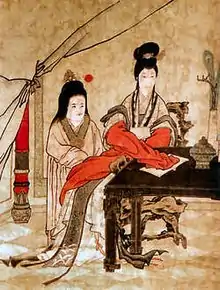Zhu Biao
Zhu Biao (simplified Chinese: 朱标; traditional Chinese: 朱標; pinyin: Zhū Biāo; 10 October 1355 – 17 May 1392) was the Hongwu Emperor's eldest son and crown prince of the Ming dynasty. His early death created a crisis in the dynasty's first succession that was resolved by the successful usurpation of his brother Zhu Di as the Yongle Emperor, an act with far-reaching consequences for the future of China.
| Zhu Biao 朱標 | |||||||||||||
|---|---|---|---|---|---|---|---|---|---|---|---|---|---|
| Crown Prince of the Ming dynasty | |||||||||||||
| Tenure | 1368–1392 | ||||||||||||
| Successor | Zhu Yunwen (as Hongwu Emperor's Imperial Grandson-heir) Zhu Wenkui (as Jianwen Emperor's Crown Prince) | ||||||||||||
| Born | 10 October 1355 Yuan Zhizheng 15, 5th day of the 9th month (元至正十五年九月五日) | ||||||||||||
| Died | 17 May 1392 (aged 36) Ming Hongwu 25, 25th day of the 4th month (明洪武二十五年四月二十五日) | ||||||||||||
| Burial | Dongling Mausoleum, Purple Mountain, Nanjing | ||||||||||||
| Consorts |
| ||||||||||||
| Issue |
| ||||||||||||
| |||||||||||||
| House | Zhu | ||||||||||||
| Father | Hongwu Emperor | ||||||||||||
| Mother | Empress Xiaocigao | ||||||||||||
While his father completed his rebellion against the Yuan dynasty, Zhu Biao was generally kept away from the front lines and provided with the most esteemed Confucian scholars of his time as tutors. Particularly by comparison with his father or brother, Zhu Biao is remembered as being soft-hearted. The official History of Ming records him once questioning his father why so many of the ministers and generals who had aided him in forming the Ming Empire were being rewarded with death or banishment. His father replied that they were like thorns on a vine; not trusting Zhu Biao to do it himself, the Hongwu Emperor was kindly removing them before passing it on to his son.
Like his son, the Jianwen Emperor, Zhu Biao had a deep appreciation for traditional Chinese culture: he was involved in a survey of Xi'an and Luoyang as potential capitals for the dynasty when he fell ill and died in 1392 at the age of 36. He was posthumously honored with the title Crown Prince Yiwen (懿文太子) by his father and Xingzong (興宗), Emperor Xiaokang (孝康皇帝) by his son.
After his younger brother Zhu Di usurped the throne, he was posthumously demoted back to Crown Prince Yiwen. During the Southern Ming, he was again posthumously restored as Xingzong and Emperor Xiaokang.
Generation poem
After his first son, Zhu Xiongying, Zhu Biao followed the practice of including a generation name into the personal names of his other children. The names followed a generation poem:[1]
允文、遵祖訓。
欽武、大君勝。
師良、善用晟。
順道、宜逢吉。
This poem would've governed the first character of the personal names of the next 20 emperors of China, but only the first two were officially ever used. After the usurpation of the Prince of Yan, the Jianwen Emperor was said to have died in a fire and his surviving children were killed or kept in isolation to prevent rivals from the throne, and the younger sons of Zhu Biao were also kept under house arrest or killed. But during Republic of China, the politician Wang Pixu (王丕煦) wrote a county chronicle for Laiyang, in which it was recorded that Zhu Yuntong had many descendants there through his son Zhu Wenkun (朱文坤).
Family

Consorts and Issue:
- Empress Xiaokang, of the Chang clan (孝康皇后 常氏; 1355–1378)
- Zhu Xiongying, Prince Huai of Yu (虞懷王 朱雄英; 1 December 1374 – 12 June 1382), first son
- Zhu Yuntong, Prince Dao of Wu (吳悼王 朱允熥; 29 November 1378 – 1 September 1417), third son
- Crown Princess Yiwen, of the Lü clan (懿文皇太子妃 呂氏; 1359–1412)
- Zhu Yunwen, the Jianwen Emperor (惠宗 朱允炆; b. 5 December 1377), second son
- Zhu Yunjian, Prince Min of Heng (衡愍王 朱允熞; 27 July 1385 – 1402), fourth son
- Zhu Yunxi, Prince Jian of Xu (徐簡王 朱允熙; 13 July 1391 – 3 February 1407), fifth son
- Unknown
- Princess Jiangdu (江都郡主), first daughter
- Married Geng Xuan (耿璿), the first son of Geng Bingwen, in 1394
- Princess Yilun (宜倫郡主), second daughter
- Married Yu Li (於禮) in 1417
- Third daughter
- Princess Nanping (南平郡主; d. 1412), fourth daughter
- Princess Jiangdu (江都郡主), first daughter
Ancestry
| Zhu Sijiu | |||||||||||||||||||
| Zhu Chuyi | |||||||||||||||||||
| Empress Heng | |||||||||||||||||||
| Zhu Shizhen (1281–1344) | |||||||||||||||||||
| Empress Yu | |||||||||||||||||||
| Hongwu Emperor (1328–1398) | |||||||||||||||||||
| Lord Chen (1235–1334) | |||||||||||||||||||
| Empress Chun (1286–1344) | |||||||||||||||||||
| Zhu Biao (1355–1392) | |||||||||||||||||||
| Lord Ma | |||||||||||||||||||
| Empress Xiaocigao (1332–1382) | |||||||||||||||||||
| Lady Zheng | |||||||||||||||||||
Notes
- This posthumous name was initially conferred by the Hongwu Emperor and restored by the Yongle Emperor.
- This posthumous name was changed by the Jiawen Emperor and restored by the Hongguang Emperor.
References
- "Generation Names of the Ming Imperial Clan" ("明宗室世系命名"). (in Chinese)